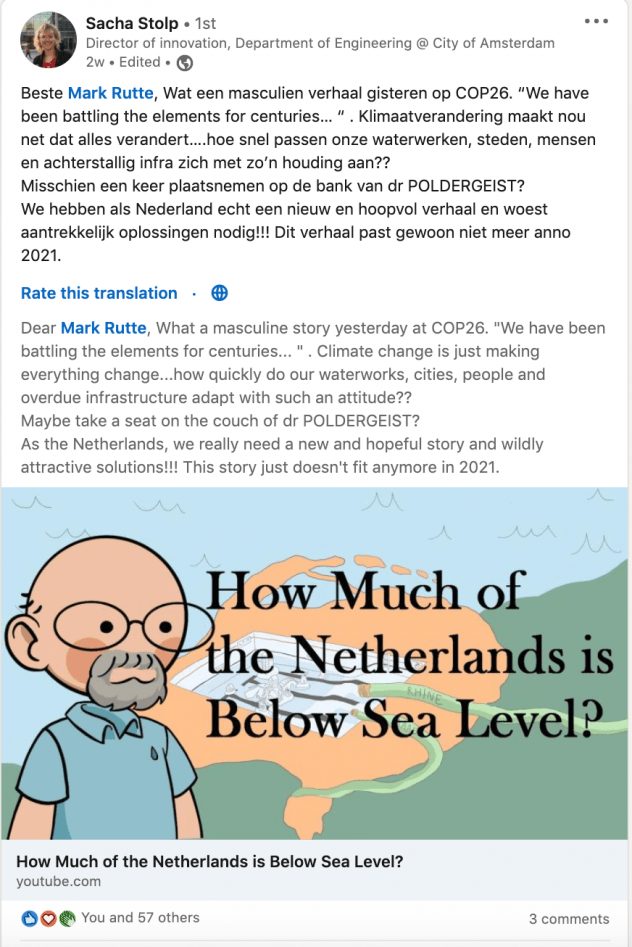How Penn’s “Dr. Poldergeist” is Trying to Help the Dutch Confront Accelerated Sea Level Rise


I couldn’t believe my eyes, but there it was on LinkedIn for everyone to see: Sacha Stolp, the Director of Innovation in the Department of Engineering for the city of Amsterdam, inviting the Dutch Prime Minister Mark Rutte “to lie down on Dr. Poldergeist’s couch.” She even included a link to the first Poldergeist Project YouTube video, “How Much of the Netherlands is Below Sea Level?” Who is Dr. Poldergeist, you ask? Well, that would be me or, to be more precise, my alter ego. This is the story of how a professor of German at the University of Pennsylvania used animated video and social media to build a platform for participating in the Dutch conversation about adapting to accelerated sea level rise.
The Netherlands has an attitude problem. Residents are convinced that they live in the “safest delta in the world.” And they’d be right if it weren’t for climate change. The vaunted Delta Works that protect the Netherlands with an integrated system of dikes, dunes, and storm surge barriers are generally adequate for a sea level rise of between 85 and 100 centimeters by 2100. But, as the Sixth Assessment of the IPCC spells out, calculations have dramatically changed. Scenarios of 2 meters and more by 2100 and 5 meters and more by 2150 are within the realm of possibility. Antarctica is in the Dutch review mirror and it’s closer than the Dutch think. Since a majority of the Dutch population and GDP are located in vulnerable areas (below sea level or along rivers prone to flooding), most people—and that includes people in government—don’t want to hear this unwelcome news.
For the past four years, my research has focused on cultural aspects of climate adaptation in the Netherlands. I regard the Dutch as a unique and fascinating case. They’re accustomed to shaping and re-shaping their country in constant interaction with the sea, the rivers, and a rising water table. Accelerated sea level rise poses a national challenge that far exceeds the worst floods in memory, whether the St Elizabeth Flood of 1421—exactly 600 years ago—or the flood of 1953 that led to the development of the Delta Works. Many in the climate and water research sector do all they can and more to call attention to the problem. Despite their efforts, disinterest, denial, inertia, and what I call sea level rise optimism prevail. Since this is clearly a cultural problem, I wondered if my insights might be of help. And how on earth would I, a professor of German at an American university, be able to convey them to the Dutch public?
During the second COVID-19 summer of 2021, I decided to try an experiment. With help from the Penn Undergraduate Research Mentoring (PURM) Program, I assembled a team of three undergrad video animators: Becky Lee, Jenesis Cochrane, and Justine Seo. We started by plunging into the research so that all team members had a good understanding of the physical and cultural situation in the Netherlands. It didn’t take long before we were brainstorming messages, scripts, and storyboards. We decided to build a persona around my Twitter handle: @Poldergeist3. Dr. Poldergeist, as we call him, has a special talent for looking below the surface and bringing difficult and uncomfortable issues to light in a friendly and humorous way. In September 2021, we released our first video.

On the surface, it’s about how much of the Netherlands is below sea level. What it’s really about is the fact that many Dutch people, including government agencies, don’t know for sure and tend to exaggerate. Dr. Poldergeist invited the Netherlands “to lie down on the couch” and offered two theories that explain the phenomenon.
The video’s reception surpassed our wildest dreams. After a month, there were over 3,500 views—most of them in the Netherlands. It was retweeted by prominent figures in the climate adaptation scene. A journalist mentioned the video in an online article—on that day alone there were 1,000 views. On LinkedIn, a slower, more professionally oriented social medium, there was a substantive discussion that drew in Dutch-trained water professionals from the Global South. Calling out Dutch “polder arrogance” and recommending “polder humility” resonated with their own experience of dealing with the Dutch water sector. Sacha Stolp’s use of the video to comment on Prime Minister Rutte’s performance at COP26 was exactly the kind of response we were looking for. Evidently, we had provided a tool that Dutch advocates could use in the service of improving Dutch policy. And now we see the first indications that schools may use the video for geography instruction.
Several factors explain the video’s success, first among them, the novel perspective. We compare the Netherlands to a drained swimming pool and, as we translate technical details according to the analogy, the long-term untenability of the Dutch situation comes into view. Second, our representation is accurate. We consulted with several prominent Dutch experts on Zoom and discussed the script and the video with them. (This experience helped Becky, Jenesis, and Justine get a real sense of the importance of what we were doing.) The names of the experts appear in the credits. Third, we included authentic cultural details that only an insider would be aware of. Fourth, we provided Dutch, English, and Indonesian subtitles. We’re ready to add more languages and, in the future, we may produce a Dutch language voice-over as well. And fifth, the gentle humor gets behind defenses and allows people to acknowledge and discuss issues they’d rather avoid. This is the service the Poldergeist Project renders to the Netherlands.
A second video called “Too Deep to Fail” is in production; many more are in development. Fine Arts Professor Joshua Mosely has joined the project and soon we’ll add a second animation team. The Sachs Program for Arts Innovation provided additional funding. Joshua and I firmly believe that animated video and research can go hand in hand. We plan to prove it with a co-taught course in the spring semester of 2023.
- Water’s Role in Environmental Health
- Fresh Water Policy & Law

